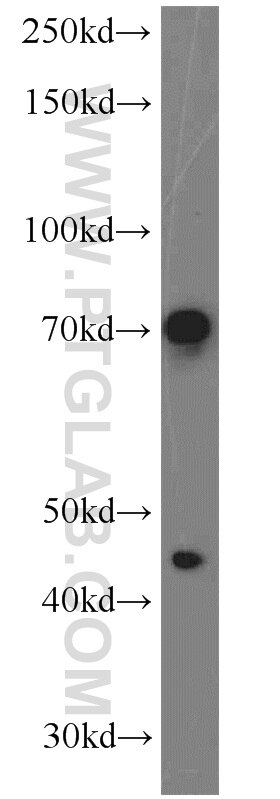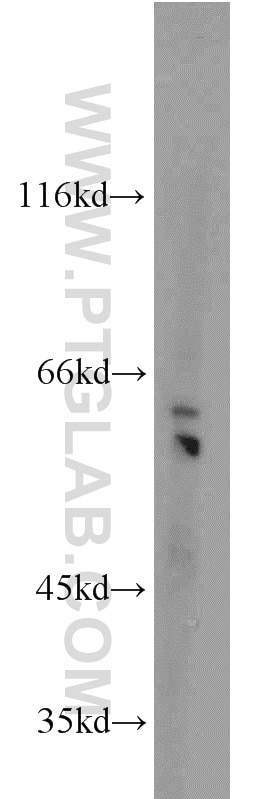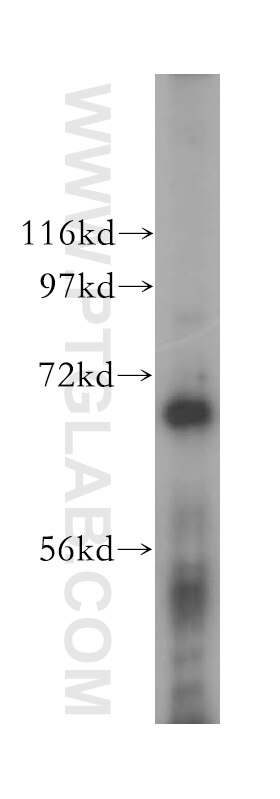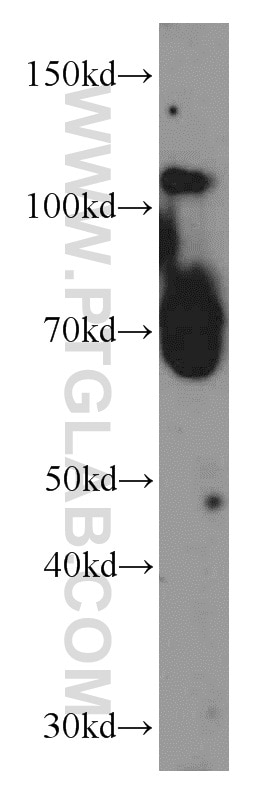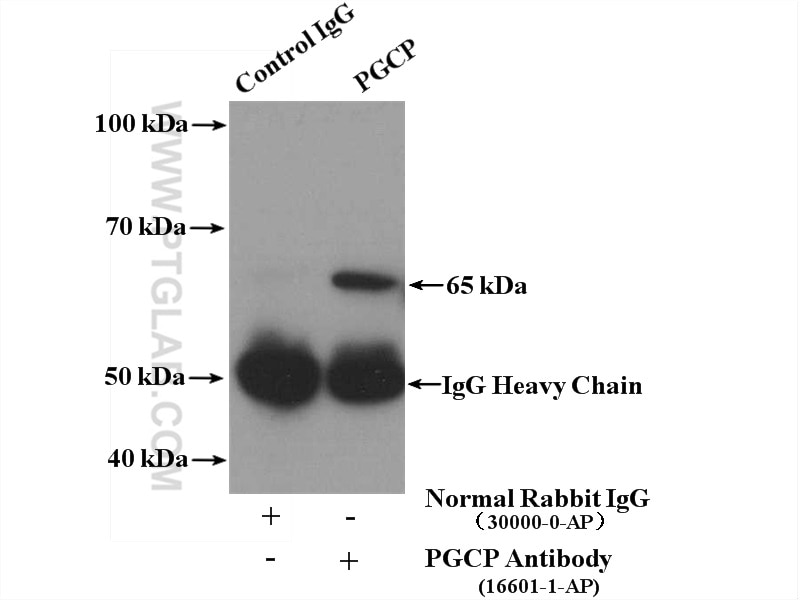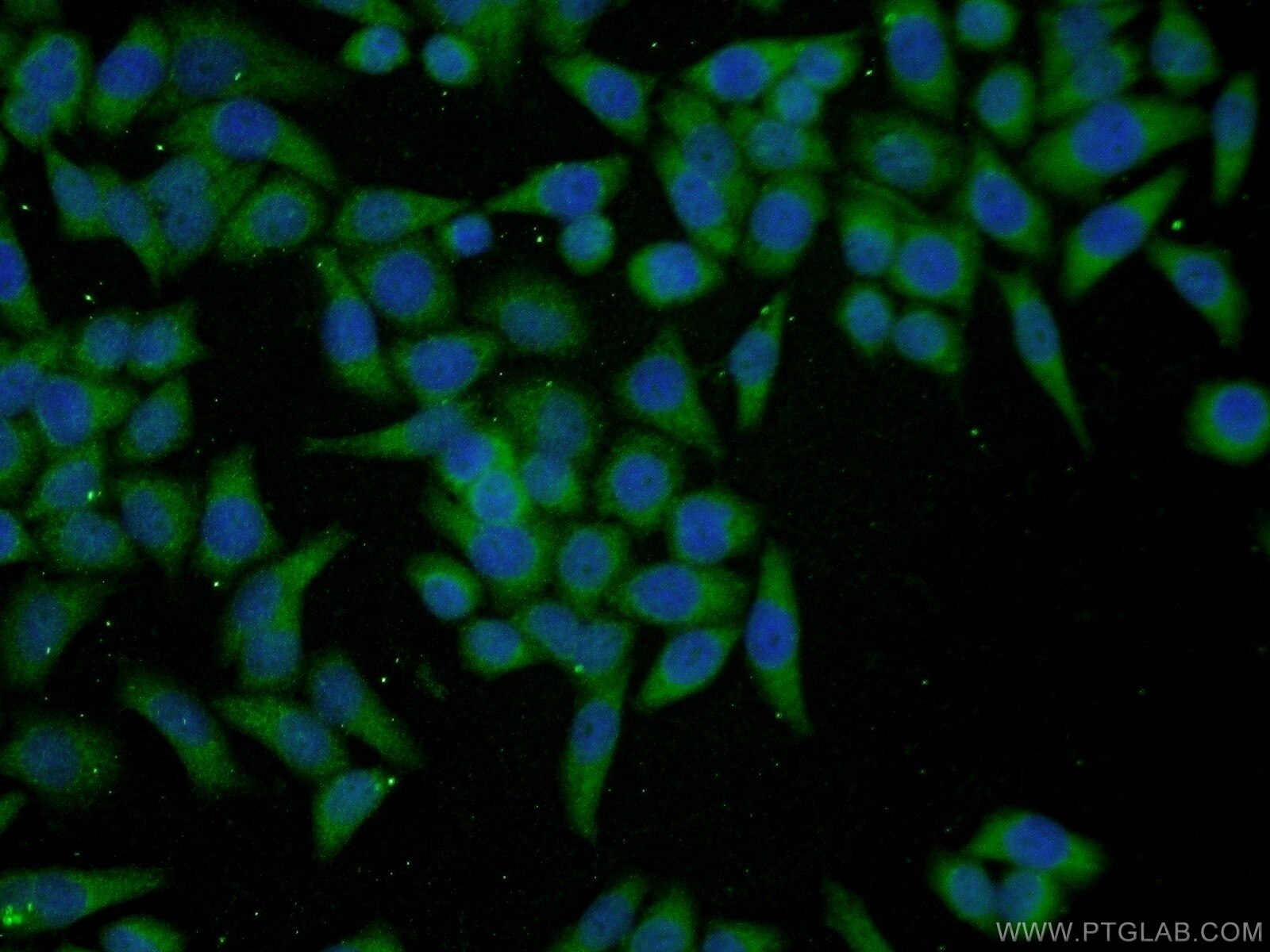Anticorps Polyclonal de lapin anti-PGCP
PGCP Polyclonal Antibody for WB, IP, IF, ELISA
Hôte / Isotype
Lapin / IgG
Réactivité testée
Humain, souris et plus (1)
Applications
WB, IF/ICC, IP, ELISA
Conjugaison
Non conjugué
N° de cat : 16601-1-AP
Synonymes
Galerie de données de validation
Applications testées
| Résultats positifs en WB | cellules L02, tissu placentaire humain, tissu plasmatique humain, tissu rénal de souris |
| Résultats positifs en IP | tissu rénal de souris |
| Résultats positifs en IF/ICC | cellules L02 |
Dilution recommandée
| Application | Dilution |
|---|---|
| Western Blot (WB) | WB : 1:500-1:1000 |
| Immunoprécipitation (IP) | IP : 0.5-4.0 ug for 1.0-3.0 mg of total protein lysate |
| Immunofluorescence (IF)/ICC | IF/ICC : 1:20-1:200 |
| It is recommended that this reagent should be titrated in each testing system to obtain optimal results. | |
| Sample-dependent, check data in validation data gallery | |
Applications publiées
| WB | See 2 publications below |
Informations sur le produit
16601-1-AP cible PGCP dans les applications de WB, IF/ICC, IP, ELISA et montre une réactivité avec des échantillons Humain, souris
| Réactivité | Humain, souris |
| Réactivité citée | rat, Humain |
| Hôte / Isotype | Lapin / IgG |
| Clonalité | Polyclonal |
| Type | Anticorps |
| Immunogène | PGCP Protéine recombinante Ag9770 |
| Nom complet | plasma glutamate carboxypeptidase |
| Masse moléculaire calculée | 472 aa, 52 kDa |
| Poids moléculaire observé | 65-70 kDa |
| Numéro d’acquisition GenBank | BC020689 |
| Symbole du gène | PGCP |
| Identification du gène (NCBI) | 10404 |
| Conjugaison | Non conjugué |
| Forme | Liquide |
| Méthode de purification | Purification par affinité contre l'antigène |
| Tampon de stockage | PBS avec azoture de sodium à 0,02 % et glycérol à 50 % pH 7,3 |
| Conditions de stockage | Stocker à -20°C. Stable pendant un an après l'expédition. L'aliquotage n'est pas nécessaire pour le stockage à -20oC Les 20ul contiennent 0,1% de BSA. |
Informations générales
PGCP(plasma glutamate carboxypeptidase) is also named as LCH1,CPQ and belongs to the peptidase M28 family. It may play an important role in the hydrolysis of circulating peptides. It catalyzes more efficiently the hydrolysis of dipeptides with unsubstituted terminals into amino acids. It is a proteinase that acts on the unsubstituted N- and C-termini of dipeptides. It has been suggested that this PGCP is involved in the release of thyroxine(PMID:20951214). Human PGCP is a metallopeptidase with five potential glycosylation sites, whose activity depends on dimerizationand it can be detected a band of 65-72kd in FRTL-5 cells which is pro-PGCP(PMID:22127294). It can be N-glycosylated(PMID:10206990). It has the pro-form of 60-65 kDa and mature form of 55 kDa(PMID:20951214).
Protocole
| Product Specific Protocols | |
|---|---|
| WB protocol for PGCP antibody 16601-1-AP | Download protocol |
| IF protocol for PGCP antibody 16601-1-AP | Download protocol |
| IP protocol for PGCP antibody 16601-1-AP | Download protocol |
| Standard Protocols | |
|---|---|
| Click here to view our Standard Protocols |
Publications
| Species | Application | Title |
|---|---|---|
Nat Commun Macrophage lineage cells-derived migrasomes activate complement-dependent blood-brain barrier damage in cerebral amyloid angiopathy mouse model | ||
Adv Sci (Weinh) Bone Marrow Mesenchymal Stem Cell-Derived Dermcidin-Containing Migrasomes enhance LC3-Associated Phagocytosis of Pulmonary Macrophages and Protect against Post-Stroke Pneumonia |
